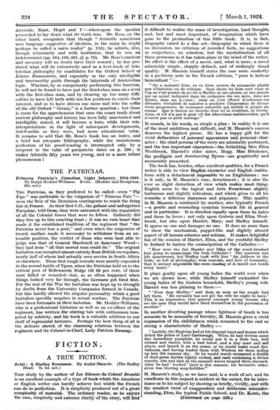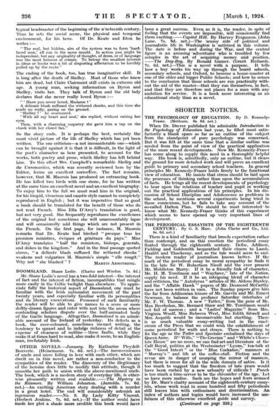FICTION:
A TRUE FICTION.
Tam study by the- author of Lea Silences du. Colonel' Bramble is an excellentexample of a type of•book which the American or English writer can hardly achieve but which the French can do to perfection.. It is simplicity produced out of a great complexity of material. The ordinary reader, as he enjoys the ease, simplicity and extreme clarity of the story, will ilnd- it difficult to realize the mass of investigation, hard thought, and, last and most important, of imagination which have gone to the production- of this little book; It is, in fact, biography raised to a fine art—biography in which there is no discussion, no criticism of recorded facts, no suggestions or conjectures, no selection, but the crystallization of all these processes as it has taken place in the mind of the writer. Its effect is the effect of. a novel, and, what is more, a novel admirably simple, . sharply defined, and of strikingly visual quality. Mr. Maurois himself states the case more modestly in a prefatory note in the French editions, " pour le lecteur hienveillant " :- " On a souhaite faire, en ce livre, oeuvre de somancier plutet que d'historien ow do critique. Sans dente les,laite- sent vrais et ron ne s'est permis de preter a Shelley ni une phrase, ni une pence qui ne soient indiquees dam lea .memoires des sec amis, dans sea lettres, dans sec poemas ; mais on s'est efforce d'ordonner ces elements veritables de maniere a produire l'impresaion de decou- verte progssive, de croissance naturelle qui semble to propre du roman. Quo le lecteur ne cherehe done ici ni erudition, m revela- tions, et s'il n'a pas- le gout vil des educationesentimentales, n'ouvre pas ce petit ouvrage."
It sounds, in his words, so simple a plan : in- reality it is one of the most ambitious and difficult, and. M. Maurois's success deserves the highest praise. He has a happy gift for the vivid delineation of personal appearance and. personal. char- acter : the chief persons of the-story are admirably portrayed, and the less important characters—the. forbidding Miss Eliza Westbrook, Harriet's elder sister, Hogg, Miss Hitchener, the profligate and domineering Byron—are graphically and memorably presented.
The book has. besides, other excellent-qualities, for a French writer is able to view Irngitsle character and English institu- tions with a detachment impossible to an Englishman : nor is it only, in M. Maurois's case, detachment ; it is also the ever so slight distortion of view which makes most things English seem to the logical and lain Frenchman slightly barbarous and slightly ridiculous, and which gives to all his remarks; a delicious sharpness and piquancy. This. quality
Maurois ia reinforced by another, also typically French —a gentle and reconciling cynicism towards, life in general and-in particular; Itis-direeted equally upon, those he-hates and those he loves ; not only upon Godwin and Eliza West- brook, but also upon Harriet; Mary; and- Shelley himself. It spares no one and damages no one. It does no more than to show the mechanical,, puppet,like and_ slightly absurd aspect of all human sehemesand actions. It-makes delightful fun of the mission of Harriet, Eliza, and the youthful Shelley to Ireland to hasten the emancipation of the Catholics :- " How were the fair Harriet and Eliza: of the much-brushed hair going to emancipate the Irish Catholics ? The question was left unanswered, but Shelley took with him ' An Address to the Irish,' so full of philosophy, wise- counsels, and love of humanity, that it seemed impossible-tho-mere reading of it. would not touch every heart."
It plays gently upon all young ladies the world over when we are shown how, while Shelley himself" enchanted the young ladies of the Godwin household, Shelley's young wife Harriet was less pleasing to them :-
" Poor_ dear Shelley ' said they, so soon as the couple had left them. He certainly has not got the wife he ought to have.' This is an impression very general amongst young women who see the man they would have liked-themselves in the possession of another."
In another diverting passage whose lightnesi of touch is too accurate to be aceusable of frivolity, M. Maurois-gives a vivid impression of the •childishness which. remained to the end so strong a characteristic of Shelley :- " Luckily, the Magician had at his disposal-ways andmeans which defied the police. of Lord Caatlereagh. When he had written some fine incendiary pamphlet, he would put it in a little box, well resined and waxed, with a lead below, and a tiny mast and sail above, and launch it on the ocean, or he would make small fire- balloons, and having loaded them with Wisdom set them sailing up into the summer sky. Or he would watch entranced a flotilla of dark-green bottles, tightly corked; and each containing a divine remedy, rise and sink as the emerald waves swayed them seaward. After he had worked ' hard in this manner, his favourite relax- ation was blowing soap-bubbles."
M. Maurois's study, as we have said, is a work of art, and its excellence in this respect.-is evident at the outlet, for he intro- duces us to his subject by showing us briefly,.vividly, and with the smallest twist of exaggeration and deliberate misunder- standing, Eton, the typical Public School, and Dr. Keate, the
lemartmed- on- nags- 3364- typical headmaster of the beginning of the n'neteenth century. Thus he sets the social scene, the physical and temporal environment, for his hero. Of Dr. Keate and Eton he writes :—
" The real, but hidden, aim of the system was to form 'hard- faced men,' all run in the same mould. In action you might be independent, but any originality of thought, of dress, or of language was the most heinous of crimes. To betray the smallest interest in ideas or books was a bit of disgusting affectation to be forcibly pulled up by the roots."
The ending of the book, too, has true imaginative skill. It is long after the death of Shelley. Most of those who knew him are dead, but Claire Clairmont still exists in extreme old age. A young man, seeking information on Byron and Shelley, visits her. They talk of Byron and the old lady declares that she never really loved Byron :- "'Have you never loved, Madame ? '
A delicate blush suffused the, withered cheeks, and this time she made no reply, gazing on the ground.
Shelley ? ' he murmured. With all my heart and soul,' she replied, without raising her eyes. Then, with a charming coquetry she gave him a tap on the cheek with her closed fan."
So the story ends. It is perhaps the best, certainly the most vivid picture of the life of Shelley which has yet been written. The one criticism—a not inconsiderable one—which can be brought against it is that it is difficult, in the light of the poet's character as here presented, to account for the works, both poetry and prose, which Shelley has left behind him. To this effect Mrs. Campbell's remarkable Shelley and
the Unromantics, which was recently reviewed here by the Editor, forms an excellent corrective. The fact remains, however, that M. Maurois has produced an entrancing book. He has killed two birds with one stone, for he has written at the same time an excellent novel and an excellent biography. To enjoy him to the full we Inust read him in the original, for his limpid, vivacious and caustic style cannot be completely reproduced in English ; but it was imperative that so good a book should be translated for the benefit of those who do not read French. Miss Ella D'Arcy's translation is good, but not very good. She frequently reproduces the excellences of the original but sometimes she will unaccountably lapse and will occasionally add things which are not present in the French. On the first page, for instance, M. Maurois remarks that Dr. Keate had birched " presque thus les premiers ministres, eveques et generaux du pays." Miss D'Arcy translates " half the ministers, bishops, generals, and dukes in the kingdom." And in the final passage quoted above, " a delicate blush suffused the withered cheeks " weakens and vulgarizes M. Maurois's simple " elle rougit."











































 Previous page
Previous page